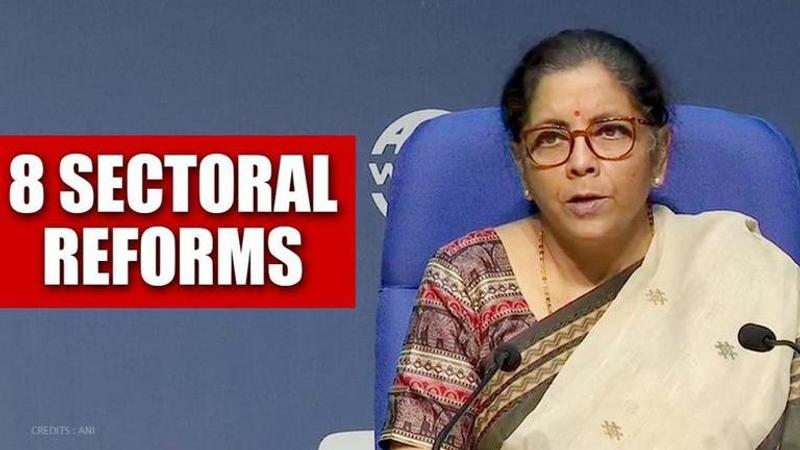Published 17:01 IST, May 16th 2020
Centre rolls out structural reforms in 8 Indian sectors in its fourth economic tranche
The Centre announced structural reforms in eight sectors in the fourth tranche of its Rs 20 lakh crore economic package amid Coronavirus lockdown in India

The Centre announced structural reforms in eight sectors in the fourth tranche of its economic package amid Coronavirus lockdown. The reforms introduced affect 8 sectors namely - Coal, defence production, minerals, civil aviation (Airports, Airspace Mgmt & MRO), power distribution in UTs, Space and atomic energy. The steps include Commercial mining in the coal sector, Seamless exploration-cum-mining-cum-production regime in the mineral sector, Corporatisation not privatisation of Ordnance Factory Board, overhauling of Airspace management, making India an MRO hub and auctioning of airports, privatisation of Power distribution in Union territories, Rs. 8000 crores to revamp Social infrastructure, Private participation boost in Space exploration and several reforms in atomic sector.
Here are the 8 sectoral reforms announced:
-
Coal sector: Commercial mining in coal sector
- Govt monopoly being removed from coal to introduce competition and private sector participation by:
- Revenue sharing mechanism instead of regime of fixed rupee/tonne
- Entry norms to be liberalised with nearly 50 blocks to be offered immediately
- Rs 50,000 crore to be provided to be given for diversified ops including evacuation of Coal India Ltd's coal, Rs 18,000 crore worth investment in mechanised transfer of coal
- Coal gasification/liquefication to be incentivised through rebate in revenue share
-
Mineral sector: Seamless exploration-cum-mining-cum-production regime
- The government is introducing a seamless composite exploration-cum-mining-cum-production regime. 500 mining blocks would be offered through open access. Govt announces the joint auction of Bauxite & coal mineral blocks to enhance Aluminium industry, which will reduce the electricity cost of Aluminium industry.
- The distinction between captive and non-captive mines removed, allowing transfer of mineral leases and sale of surplus unused minerals. Mineral Index for the different mineral process is on. Rationalism of stamp duty payable at the time of award of mining leases is introduced.
-
Defence production: Corporatisation not privatisation of Ordance Factory Board
'Make in India' defence production to notify:
- List of weapons for ban on import with year-wise timelines
- Indigenisation of imported spares will be given priority
- Separate budget provisioning for domestic procurement to reduce Defence import bill
- Corporatisation of Ordance Factory Board to improve autonomy, accountability and efficiency in ordnance Supplies
- FDI limit in defence manufacturing under automatic route raised from 49% to 74%
- Time-bound defence procurement process to usher faster decision making, with overhauling of trial and testing procedures
-
Civil aviation: Airspace management, MRO hub in India, auction of airports
- Only 60% of Indian airspace is currently available. Hence, restrictions on utilisation of air space is eased to benefit about Rs 1000 crores per year. It will result in reduction in fuel use, time and positive environmental impact.
- Additional six airports are in the auction, adding to six airports up for auction in PPP basis. The first 2 rounds are expected to get Rs 13,000 crores.
- India will become a global hub for Aircraft Maintenance, repair & overhaul by rationalising Tax regime for MRO ecosystem. Convergence between defence sector and civil MROs to be established.
-
Power distribution in Union territories to be privatised
Power distribution coompany in UT shall be privatised, announces Centre. A tariff policy will be released focusing on consumer rights, promoting inductry, sustainability
Power dept/utilities in UTs will be privatised
-
Social infrastructure to be revamped though Rs 8000 crore Viability Gap Funding scheme
Boosting private sector investment in social infra through revamped viability gap funding scheme. The govt will enhance the quantum of viability gap funding upto 30% each of total project cost as VGF aby Centre and states
-
Private participation boost in Space exploration
- Indian private sector will be allowed into space industry to provide level playing field for private companies in satellites , launches and space based services.
- Private sectors will be allowed to use ISRO facilities
- Future projects for planetary exploration, outer space travel to be open for private sector
-
Atomic Energy related reforms
- Govt to establish research reactor in PPP mode for production of medical isotopes
- Facilities in PPP mode to use irradiation technology for food preservation
- Technology development cum Incubation centres to be set up for co-ordiabtion between research facilities and tech-entrepreneurs
Updated 17:18 IST, May 16th 2020




